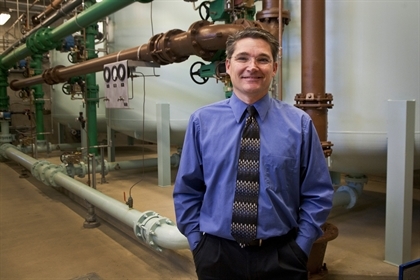
What Our Water's Worth is a campaign led by the Metropolitan Planning Council and Openlands to raise awareness about the value of water in northeastern Illinois and northwestern Indiana.
Good riddance, radium: Ion-exchange provides clean water in Lake Zurich, Ill.

Public Works Director Dave Heyden in the Village of Lake Zurich's ion-exchange facility.
Story by Marie Donahue, Photos by Emily Cikanek
When one reads “radioactive material” and “groundwater” in the same sentence, it is easy to get a little nervous. Yet many people don’t realize that trace levels of radioactive materials, or “radionuclides,” are found naturally in some of the deep bedrock aquifers many of us in the Chicago area rely on for drinking water. These elements, most commonly the isotopes of Radium-226 and Radium-228, “occur naturally in rock formations deep below the surface of the earth and enter the deep aquifer water supply by bonding with the mineral deposits in the water,” explains David Heyden, who has become quite familiar with radium contamination issues over the past five years in his role as the Village of Lake Zurich’s public works director.
As “natural” as radium is, it certainly is not good for us. Exposure to elevated levels of radium in drinking water is linked to greater risk of bone cancer. Bones absorb the radiation, and it accumulates in the body. For that reason, the U.S. Environmental Protection Agency (EPA) requires that potable water contain less than 5 picocuries per liter of radium (a picocurie measures how many bursts of radiation a radium atom gives off per second.) For reference, the deep wells supplying water to the Village of Lake Zurich contained natural radium levels in the range of 5 to 15 picocuries per liter.
That’s where modern engineering and savvy water practitioners like Heyden come into the picture. Communities entrust these professionals with developing creative solutions to the most pressing water supply concerns, including removing excess radium from our drinking water.
Read the rest of the story at chicagolandh2o.org >>
Water conservation tips
Observe local water conservation ordinances. For example, the Village of Lake Zurich Water enforces water conservation guidelines from June 1 through Sept. 15 for lawn watering and other outdoor uses, which are only permitted between the hours of 5 to 10 a.m. and 5 to 10 p.m. Be sure to check with your local water department and observe any water conservation ordinances to save water and avoid unnecessary fines!
Reuse water on a residential or commercial scale. An action as simple as using the water collected from your dehumidifier or air conditioning unit to water plants can help reduce the amount of water needed to be withdrawn and treated from our region’s deep wells.
Install native landscaping with deep rooted prairie plants. Native vegetation helps infiltrate water back into the ground. Not only does this help recharge our region’s surface water and shallow aquifers, but plant roots are also great at filtering unwanted chemicals and contaminants out of stormwater runoff.
Featured Resources
- Village of Lake Zurich: 2011 Water Quality Report
- Village of Lake Zurich, Public Works Department
- Deep Bedrock Aquifer fact sheet
- “Radium in Drinking Water,” an article and FAQ from the Illinois Dept. of Public Health
- “Radium in Ground Water from Public-Water Supplies in Northern Illinois,” an article from the US Geological Survey
December 2011
www.chicagolandh2o.org
Water Headlines
The WOWW factor
5 picocuries/liter
The maximum contaminant level for radium established by the U.S. EPA in the early 2000s. Communities must comply with this safe drinking water standard.
$10 million
The estimated investment the Village of Lake Zurich has made in constructing, operating, and maintaining its ion-exchange facilities to remove radium from its deep groundwater wells.
20 years
The lifespan of one of Lake Zurich’s ion-exchange holding tanks — where the controlled radium removal process occurs. Due to the corrosive nature of the salt-brine solution used as a backwash, the tanks must eventually be replaced.
2 million gallons per day
The amount of water the village of Lake Zurich pumps from the deep bedrock aquifer and treats through its radium removal process.
What Our Water's Worth is a monthly e-newsletter. Tell us what you think. Email info@chicagolandh2o.org with feedback in the subject.
To subscribe, visit our website at chicagolandh2o.org.

|
Metropolitan Planning Council
140 S Dearborn St | Suite 1400 | Chicago, IL 60603 Phone (312) 922-5616 phone | Fax (312) 922-5619 |
Openlands
25 E. Washington St. | Suite 1650 | Chicago, IL 60602 Phone: 312-863-6250 | Fax 312-427-6251 |
Copyright © 2026. All rights reserved. | info@chicagolandh2o.org
To stop receiving this newsletter visit metroplanning.org/unsubscribe.html?EmailMsgId=151&email=
